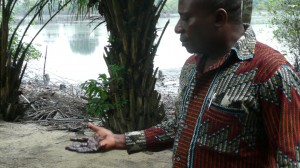
One of the world’s largest polluters is being held accountable for massive oil spills that destroyed farmlands in the Niger Delta. A Dutch court ruled on January 30 that Royal Dutch Shell is responsible for a series of spills that devastated the community of Ikot Ada Udo in 2007. The milestone ruling sets a precedent that multinational climate polluters can be held accountable for environmental damage they cause in impoverished, resource-rich countries like Nigeria.
“Shell’s disdain for the well-being of communities that suffer the impacts of its reckless exploitation of oil in the Niger Delta has been legendary,” says Nnimmo Bassey, Global Greengrants Fund board member and Friends of the Earth Nigeria Executive Director. “The spill at Ikot Ada Udo lasted for months. It is just and fair that the company is held accountable for this crime.”
Local communities stand up to big oil
It all started in 2007, when rural community activists gathered for the first time in Warri, Nigeria. Global Greengrants Fund supported this historic meeting, at which communities formed alliances and shared ideas on how to reclaim their rights from the multinational oil companies destroying the delta’s wetlands. They started organizing and formed a nonprofit called Host Communities Network, which helps mobilize activists to resist destructive oil and mining practices.
Since then, Global Greengrants Fund has continued to make grants to Host Communities Network, as well as other communities negatively impacted by Nigeria’s hugely destructive oil industry. Check out all of our recent grants made in the Niger Delta.
“The environment is a resource and all of us must take it very seriously. We have to appreciate the fact that laws are made by human beings and it is possible for human beings to change the laws.” –Che I. Ibegwura at the first meeting of the Host Communities Network of Nigeria
It was through Host Communities Network that four Nigerian farmers brought cases against Shell in 2008. Global Greengrants Fund partner Friends of the Earth was instrumental in supporting the farmers to bring their suits to Dutch court.
Shell must clean up its act
Shell has consistently denied responsibility for oil spills in the Niger Delta, refusing to clean up spilled oil or compensate farmers whose lands have been damaged. Unfortunately, the court recognized only one of the four communities, siding with Shell’s argument that oil pipelines in the other three communities had been sabotaged, reported Reuters.
“There are many things about the judgment that we will challenge,” Bassey says. “The facilities were rotten, not sabotaged. We see a crack in this thinking that can be used to challenge Shell.”
Still, activists in Nigeria and beyond see this ruling as a critical first step in holding climate polluters accountable for destructive practices in countries around the world.
Oil in the Niger Delta
- The Niger Delta is the world’s third-largest wetland and one of the most oil-polluted places on Earth.
- Supporting a population of nearly 30 million people, the delta experiences the equivalent of one Exxon-Valdez–size oil spill per year.
- In the Ogoniland region of the Niger Delta, oil clean-up would cost $1 billion and take more than 25 years, according to a 2011 United Nations report.
- For a compelling look at the history of human and environmental problems triggered by Nigeria’s oil industry, read this article published in World Policy Journal.
